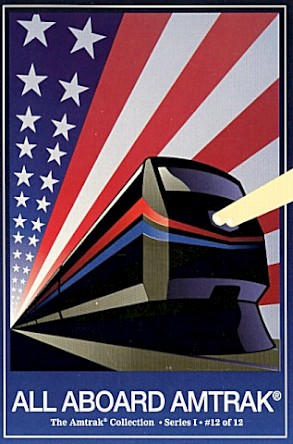Happening Now
Trains: Carriers of the American Dream
July 5, 2012
Written By Malcolm Kenton

As I took in a parade and fireworks to celebrate Independence Day yesterday, I was thinking about what we Americans value and take pride in, and how passenger trains, especially where they are frequent and reliable, either embody or contribute to these values.
I guess it's no surprise, given the extent to which railroads made, and continue to make, America as we know it possible. All of the successful social movements in American history eventually gained broad public support by appealing to these commonly-held values and ideals. Train advocates should do the same, as such appeals can more effective than citing charts and statistics.
Freedom: While many associate the car with freedom, I feel more free when I am on a train--where I can move about, get a bite to eat, talk to fellow travelers, and enjoy the view without having to focus on the road ahead or figuring out directions--than cooped up and enduring the stress of driving especially in traffic, which is commonplace in the urban areas where most Americans live.
Americans also cherish our freedom of choice and the luxury of having many options available to us. Yet decades of misguided policy have left us with very few real choices when it comes to how to get around. An extensive national passenger train network would give more of us real choices, allowing us to pick the mode of travel that best suits our needs and desires. If given the choice, despite what rail critics would have you think, I am sure many more Americans would choose the train. Record numbers already are, even in places served by only three trains a week.
Equal Opportunity: The limited ability to travel that comes from a lack of choices means that people in many parts of the country have less access to jobs, medical care, and other services that are essential to the quality of life. With both auto and air travel becoming more expensive, having the train as an option makes a real difference in people's lives, especially in small towns and rural areas, helping to make the American dream more achievable for them.
Over-reliance on the automobile also puts those who cannot or do not want to drive at a significant disadvantage, greatly limiting their opportunity to fully participate in society. Investing in an expansive modern passenger train network not only brings many opportunities closer to the communities served, it also creates a plethora of good paying jobs--both with railroads and in industries that supply or benefit from them--that can't be outsourced.
America the Beautiful: Many of the patriotic songs we sing on July 4th extol the grandeur of our land and the strength and diversity of our people. There are few better ways to experience the full breadth of our country than aboard a train. In fact, Katherine Lee Bates was inspired to pen the poem (which later became the song) "America the Beautiful" by taking a train ride to the top of Pike's Peak in Colorado and surveying the landscape spread out before her.
Short of walking and cycling, trains give the traveler the most intimate experience of the landscape that is such a part of who we are as a nation. Trains also give travelers the opportunity to connect with others in ways that aren't possible in planes and buses, allowing passengers to experience America's wonderful diversity. Train riders also know that they are doing less damage to the land and air when they take the train versus driving and flying.
Your work to influence your elected representatives and educate people you know about the reasons to support a world-class passenger train network in the USA demonstrates your commitment to some of our nation's highest ideals.
"On behalf of Amtrak’s onboard service staff, I want to thank the Rail Passengers Association for honoring their hard work with this award. The past couple years have indeed been difficult for Amtrak onboard service staff – coping with furloughs and job insecurity, adapting to changing protocols and services, not to mention the unfortunate events such as a tragic derailment and a fatal shooting. Nevertheless, our dedicated members at Amtrak have handled these hurdles with the care, attention and diligence for which they’re known. We thank Rail Passengers for their acknowledgement of our members’ hard work and, as always, look forward to seeing you on the rails."
Arthur Maratea, TCU/IAM National President
December 21, 2021, on the Association awarding its 2021 Golden Spike Award to the Frontline Amtrak Employees.
Comments